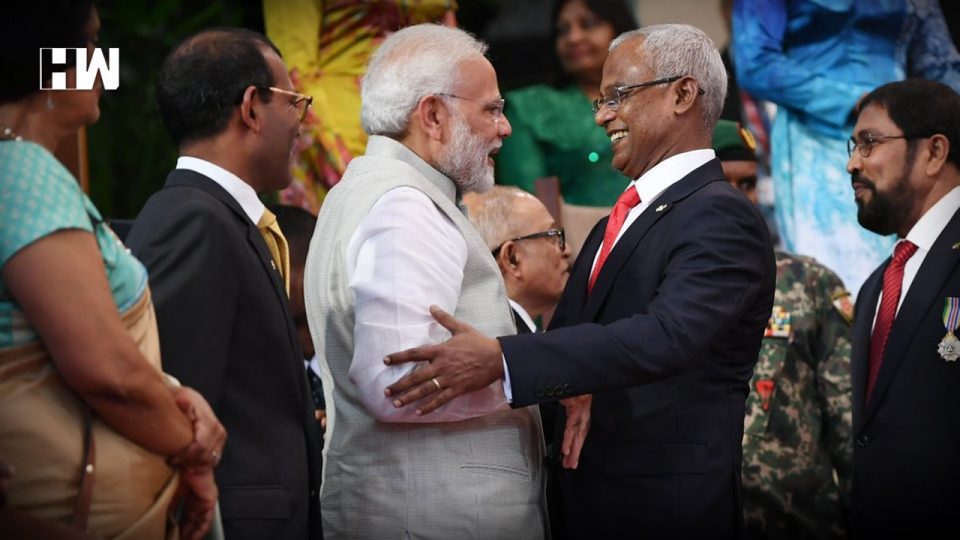“We in India strongly desire to see a stable, democratic, prosperous and peaceful Republic of Maldives,” the prime minister had said to Solih.
Male| Prime Minister Narendra Modi on Saturday said that he is looking forward to working with new Maldivian President Ibrahim Mohamed Solih to strengthen India’s bilateral relations with the strategic Indian Ocean island nation.
Prime Minister Modi attended the swearing-in ceremony of Solih, who surprisingly defeated strongman Abdulla Yameen in September.
During the swearing-in ceremony of Solih, Modi was sitting beside former Maldivian presidents Mohamed Nasheed and Maumoon Abdul Gayoom. Former Sri Lankan president Chandrika Kumaratunga also attended the ceremony.
Modi congratulated President Solih and also interacted with leaders from the Maldives and other parts of the world during the oath-taking ceremony at the National Stadium.
Congratulations to Mr. @ibusolih on taking oath as the President of the Maldives.
Wishing him the very best for his tenure ahead.
Looking forward to working with him to strengthen bilateral relations between our nations. pic.twitter.com/HryxQQMadt
— Narendra Modi (@narendramodi) November 17, 2018
Congratulations to Mr. @ibusolih on taking oath as the President of the Maldives. Wishing him the very best for his tenure ahead. Looking forward to working with him to strengthen bilateral relations between our nations, Modi tweeted.
Ministry of External Affairs spokesman Raveesh Kumar said that President Solih in his address to the People’s Majlis (Parliament) asserted that the Maldives will endeavor to fortify its existing ties with India.
“Maldives President Solih in his address to the People’s Majlis: We will endeavor to fortify existing ties with India. The Maldives will hereupon bolster its shared role to retain enduring peace & harmony of the Indian Ocean,” Kumar tweeted.
Solih, 54, the opposition Maldivian Democratic Party’s candidate, had surprisingly emerged victorious over incumbent president Yameen in the election held on September 23.
Had productive discussions with President @ibusolih. pic.twitter.com/AI4pyYvvnI
— Narendra Modi (@narendramodi) November 17, 2018
On arrival in the Maldivian capital, Prime Minister Modi was given a red carpet welcome and was received by Maldives Parliament’s new Speaker Qasim Ibrahim.
This is Modi’s first visit to the Maldives as prime minister. The last visit by an Indian Prime Minister to the Indian Ocean island nation was by Manmohan Singh in 2011.
“The visit reflects India’s commitment to assist the Government & people of Maldives in their endeavor to build a peaceful, democratic & prosperous country, Kumar tweeted.
In a series of tweets ahead of the visit, Modi had tweeted, “I will convey to the new Maldivian Government of Mr. Solih the desire of the Indian Government to work closely for a realization of their developmental priorities, especially in areas of infrastructure, health care, connectivity & human resource development,”
He said the recent elections in the Maldives represent the collective aspirations of the people for democracy, rule of law and a prosperous future.
“We in India strongly desire to see a stable, democratic, prosperous and peaceful Republic of Maldives,” the prime minister had said.
The Maldives is the only South Asian Association for Regional Cooperation SAARC country that Modi has not visited. His visit to the Maldives, a strategically vital island and a popular tourist destination, was canceled in March 2015 due to the volatile political situation then.
India-Maldives ties came under strain under Yameen who was perceived to be close to China. Some decisions by Yameen including the imposition of restrictions on work visas for Indians and signing of a new Free Trade Agreement with Beijing also did not go down well with New Delhi.
Relations between India and the Maldives deteriorated further after Yameen imposed emergency on February 5 this year. India had criticized his decision and asked his government to restore the credibility of the electoral and political process by releasing political prisoners. The emergency lasted for 45 days.
As an independent media platform, we do not take advertisements from governments and corporate houses. It is you, our readers, who have supported us on our journey to do honest and unbiased journalism. Please contribute, so that we can continue to do the same in future.

